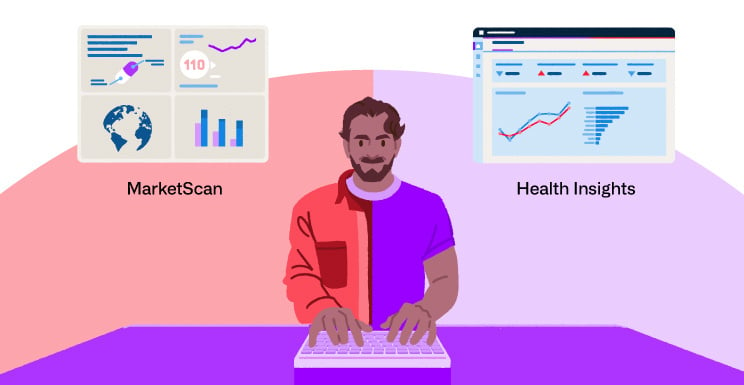Niche vs. enterprise analytics: Choosing the right path for healthcare success

Healthcare organizations are awash in data—from clinical records to operational metrics to financial performance. Yet, turning that data into actionable insights remains a challenge. Disconnected systems, siloed tools, and fragmented analytics often prevent payers, providers, and life sciences companies from fully leveraging their data to improve outcomes, reduce costs, and drive innovation.
Data is abundant in healthcare, but insight is scarce.
The real challenge is connecting the dots across the enterprise.
To unlock the full potential of healthcare data, organizations need a strategic, future-ready analytics approach. Choosing the right analytics platform is at the heart of that strategy. While there are many options, they generally fall into two categories: niche and enterprise.
Defining the landscape
- Niche analytics: Specialized tools built for specific functions or departments—think clinical decision support, population health dashboards, or revenue cycle analytics.
- Enterprise analytics: Comprehensive platforms designed to serve the entire organization, integrating data across departments and use cases into a unified system.
Making the strategic choice
Healthcare leaders must look beyond short-term needs and evaluate how their analytics investments align with long-term goals. Here’s how the two approaches stack up:
Niche analytics: Precision with limitations
Niche applications offer targeted area expertise and tailored features. They can have a potentially lower implementation cost and a faster time-to-value for their specific use cases.
However, they can also create or exacerbate data siloing, providing fragmented and limited insights, which are often reliant on specialists to fully leverage. Niche applications may not be designed to integrate with other tools and systems, limiting scalability opportunities and resulting in unwieldy data governance, especially when multiple disparate applications are at play. An organization may also be burdened with compounded costs to maintain multiple niche applications.
For organizations not yet positioned to invest in and focus on long-term growth, an enterprise solution may provide broader capabilities that are outsized to their short-term niche needs.
Enterprise analytics: Unified, scalable, strategic
An enterprise analytics platform provides a unified data view, consolidating data from multiple sources, systems, and channels. This scalability across clinical, operational, and financial business units gives decision-makers a holistic view and a “single-source of truth.”
Enterprise analytics creates easier compliance, governance, and security management (which is critical for organizations responsible for sensitive and protected data, like healthcare companies that must meet strict data privacy regulations like GDPR and HIPAA). Implementing an enterprise platform also streamlines vendor engagement and support, which can increase operational efficiency and reduce costs.
The analytics available from enterprise platforms are accessible across the organization and can serve multiple types of users. Different departments with different business questions to answer can pull from the same data model, with the same data, and common definitions and analytic insights.

Can you have both?
Some organizations adopt a hybrid model—using niche tools for specific tasks while relying on an enterprise platform for broader analytics. While this can work temporarily, it often introduces complexity, duplication, and governance challenges.
Hybrid models are a bridge, not a destination. Eventually, integration wins.
Modern enterprise platforms increasingly offer modular capabilities that replicate niche functionality—without sacrificing integration. Features like APIs, embedded analytics, and customizable dashboards allow organizations to tailor enterprise platforms to specific needs while maintaining consistency and scalability.
Key considerations for healthcare leaders
When evaluating analytics investments, consider the following:
Data maturity & governance
- Are your data management practices effective?
- How many data sources are you leveraging?
Centralized vs. decentralized needs
- Are analytics performed by individual departments or a centralized team?
- Do you need a hybrid structure that supports both?
Speed vs. scale
- Are you solving for immediate needs or building for long-term growth
Current state
- What tools are already in place?
- Are they meeting your evolving needs?

The right analytics strategy balances speed with scale, and precision with integration.
Final thoughts: Enterprise analytics as a strategic imperative
In today’s healthcare landscape, data is more than an asset—it’s a catalyst for transformation. While niche analytics can deliver quick wins, they often fall short in supporting enterprise-wide strategy, integration, and growth.
Enterprise analytics platforms standardize data models and report logic across the organization, enabling consistent KPI definitions across varying business units, automated report generation, and seamless integration with downstream systems. Enterprise analytics platforms empower organizations to break down silos, ensure compliance, and unlock the full value of their data. For healthcare leaders committed to innovation, agility, and long-term success, enterprise analytics isn’t just a better option—it’s essential.
If you would like to learn more about how enterprise analytics can help with your long-term goals check out our Health Insights demo or schedule a consultation.
Related Articles

Healthcare price transparency: What it means for members, employers, and health plans
In today’s digital world, consumers can shop for goods and services with just a few...
By Bryan Briegel | 5 min. read

From data to decisions: How Truven is shaping the future of healthcare
2024 has been a landmark year for Truven, filled with significant milestones and...
By Marcy Tatsch | 4 min. read

Insights to improve benefits offerings and spend for diabetes and behavioral health
Rising healthcare costs, provider network consolidation, and inflation have all...
By Chris DeStasio | 4 min. read
Ready for a consultation?
Our team is ready to answer your questions. Let's make smarter health ecosystems, together.
